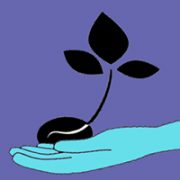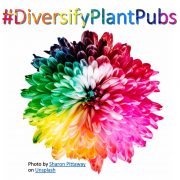Transitioning in the lab
I work as a bioinformatics-focussed research assistant in the Osbourn group at the JIC, which is the same lab I did my PhD in. Our lab focusses on plant natural product biosynthesis, and my own research involves leveraging the huge (and ever increasing..!) wealth and diversity of ‘omics data to this end. This involves building tools to rapidly classify and predict the function enzyme families, analyses of gene expression data and the search for biosynthetic gene clusters.
My PhD was a mixed experience. I really enjoyed the freedom I had to pursue the questions that seemed the most worthy and to build the skills I wanted. However, I had to take an interruption after the second year as I had a severe mental breakdown. This had been coming for quite some time, as it was during my recovery when I realised that I was transgender. Amidst suicidality, divorce, having no income and a precarious relationship with my family, I felt like I really had no hope of making it through.
I admit I had to seriously consider whether returning to academia was right for me, as I had been very caught up in feeling like my self-worth was intrinsically tied to my results (something I know a lot of us struggle with!). Given I felt like I had already broken everything of my past self, and now had no real choice but to rebuild, eventually I decided to at least try coming back. I was very grateful that not only was there a PhD still there for me to return to when I was able, but I was able to do so part-time. The flexibility of working hours, and the implicit trust and respect of my supervisor and workplace, meant a great deal indeed.
Coming out at work was terrifying, especially as I had built habit of hiding my depression through being falsely socially conspicuous (the ‘guy’ with the big beard, who always wears strikingly patterned button-up shirts, and is at the bar with colleagues every Friday evening is surely having fun, right?). Luckily I got some really kind responses from my lab group and felt very supported by the supervisory staff in general, so I managed to re-find my confidence as time went on. Even then, for the first few months most days started and/or ended with a cry in my car.
Of course, I wouldn’t have survived were it not for the NHS. There have been individual health workers who have made an incredibly positive impact on my life over the past few years, but the NHS does have problems (mainly due to understaffing and underfunding in my experience). I really struggled to get the mental health care I needed until things got immediately life-threatening. Furthermore, waiting times for gender identity clinics are depressingly long, and even then, the progression through the system is strict, depending heavily on the impression you make to the clinicians. There are some new pilot schemes in place attempting to solve this, but access to those is limited and location-based. In addition, there is an exceptionally hostile media climate regarding transgender people currently in the UK, which seriously impacts the willingness of decision makers to be seen doing anything that makes things ‘easier’ for us.
Beyond the simple outcome of feeling alive and open to my future for the first time, one of the most joyous things I’ve found through my experience of transition has been exposure to such a great diversity of people. Through local LGBTQ+ groups, online queer communities and even spaces such as group therapy, I’ve met, learnt from, and made friends with people who have a huge range of experiences and backgrounds. I suspect I would have had a much narrower view of the world had I been a cis scientist carrying on with my old life.
I do still struggle to weigh my perceptions of academic professionalism and acceptance with the truth of the wider LGBTQ+ world. Addressing things such as non-binary identities and the use of neopronouns, the validity of sex work as real work, or the (often unconscious) role of biologists in eugenicist discourse all feel like real challenges to me. I hope that we can continue to build inclusive and empathetic spaces, across institutions and borders, in order for all to see our human diversity for the wellspring of joy that it is.
By Charlotte Owen, Ph.D.
Charlotte is working on increasing our understanding of the nature of genes which encode for interesting and novel compounds produced by plants. She uses computational approaches to find, classify and analyze enzymes and other genes that are involved in specialized metabolism across the plant kingdom. The two main goals of her work are to understand the evolutionary pathways that such genes have travelled and to build models and tools that allow us to predict the kinds of chemicals they might make. This work involves building and using high-throughput, systematic tools and bioinformatic pipelines, as the breadth and scope of available ‘omics data is vast, and ever increasing. Charlotte collaborates with many people who work in the lab, from chemists to geneticists, and often works to integrate their expertise into the tools and models she builds in order to produce results which inform the design of future experiments. This includes a wide range of subjects, from learning how genes are organized spatially and temporally in plant genomes, to understanding and predicting how enzymes are able to perform novel and interesting chemical reactions.






